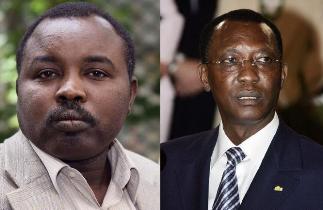Chad’s President meets with SLM leader in France
January 25, 2008 (PARIS) — The Chadian President Idriss Deby met last Monday with the leader of the Sudan Liberation Movement (SLM) Abdel Wahid Al-Nur in the French capital where Deby was on a private visit.
 “I met with the Chadian President Idriss Deby where he reiterated his support for the efforts to reach a lasting peace in Darfur led by the State of Qatari” Al-Nur told Sudan Tribune today.
“I met with the Chadian President Idriss Deby where he reiterated his support for the efforts to reach a lasting peace in Darfur led by the State of Qatari” Al-Nur told Sudan Tribune today.
Following the refusal of the SLM founder to sign the Darfur Peace Agreement (DPA) and the deterioration of the relations between Khartoum and N’djamena, Chad has been seen supportive for the rebel Justice and Equality Movement (JEM) and another faction of the SLM on the basis of tribal considerations.
The Chadian president belongs to the Zaghawa tribe while the SLM leader is from the Fur tribe.
The rebel chief said that during the unprecedented meeting, Deby encouraged him to take part in the Qatari Initiative stressing that “after six years of war the people of Darfur deserve a just peace to return home and develop their region”.
Last September the Arab League foreign ministers formed a ministerial body co-chaired by the Qatari foreign Minister, Hamad bin Jasim Al-Thani, Chairperson of the African Union (AU) Commission, Jean Ping and Arab League Secretary General Amr Musa.
The panel is charged with the organization and sponsorship of peace negotiations between the Sudanese government and the rebel movements. Qatar has been chosen to host the peace talks.
However Darfur rebel groups appeared hesitant to accept the Qatari sponsorship of talks saying that the Arab Gulf State cannot be a neutral broker given its strong relations with Khartoum.
According to Al-Nur, Deby also underlined that peaceful settlement of Darfur crisis “is crucial for the regional stability”.
Following the eruption of Darfur rebellion in February 2003, the Chadian government sponsored a series of peace talks to end the crisis and alleviate the humanitarian needs. Khartoum and the rebels signed a ceasefire agreement in April 2004 in the capital N’djamena. The talks were later transferred to Abuja, Nigeria.
Al-Nur described the two hours meeting as “cordial and instructive” adding that both sides exchanged views on the peace process and the necessary conditions “to create a conducive environment for the peace process”.
He further said that his delegation explained that peace is the strategic choice of the movement and that their main demands focus on the rights and the security and humanitarian situation of the victims of this conflict.
“We stressed the importance of the conflict suspension process in realizing a sustainable peace in Darfur” Al-Nur said.
“We want to engage Khartoum to prove its good faith and its seriousness to achieve peace. Because people can easily understand that we do not trust them. They broke it by the genocide and crimes against humanity committed against Darfur people and the continual aggression on Darfur civilians. They did not even honor the DPA signed with Minnawi” he added.
In the ‘Conflict Suspension proposal’, Al Nur demands that the Sudanese government disarm the Janjaweed militias and commits itself to the 2004 ceasefire agreement.
Furthermore Al-Nur demands that the IDP’s and refugees be allowed to return to their lands and the expulsion of the newcomers from the Arab tribes from Mali and Chad who settled in the IDP’s villages.
The rebel leader said that peace talks should be dedicated to the roots causes of the conflict and government should make “sincere” efforts to repair the consequences of the war first.
During several years Sudan and Chad accused each other of supporting rebel groups in the two countries.
Sudan had severed its relations with Chad last may after a raid by JEM rebels on the capital last May.
However under regional and international pressures the two countries resumed bilateral relations last August and decided to work together for peace in the region.
UN experts estimate some 300,000 people have died and 2.5 million driven from their homes. Sudan blames the Western media for exaggerating the conflict and puts the death toll at 10,000.
(ST)
